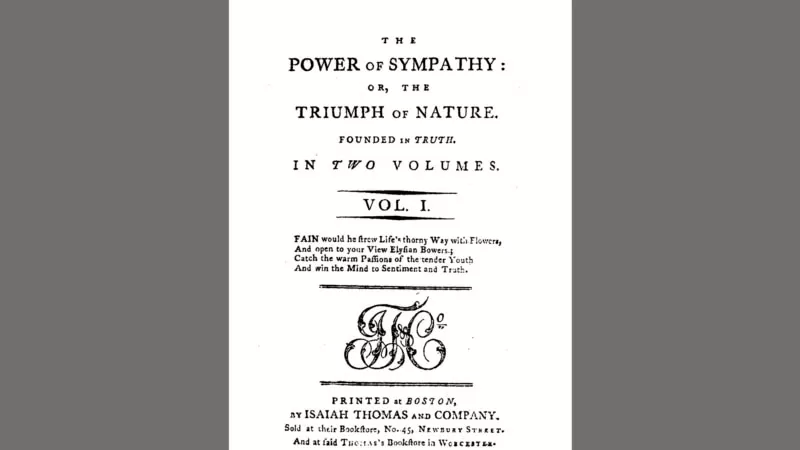NEW YORK – In the winter of 1789, as George Washington was elected the first president of the United States, a lesser-known event took place in the world of literature. The publication of William Hill Brown’s The Power of Sympathy by Isaiah Thomas & Company marked the birth of the first American novel.
At just around 100 pages long, Brown’s novel tells the story of two young New Englanders whose love is cut short when they discover a shocking secret that makes their relationship unbearable. With a dedication page addressed to the “Young Ladies of United Columbia,” Brown promised to expose the “Fatal consequences of Seduction” and provide guidance for the “Economy of Human Life.”
Although The Power of Sympathy is now recognized as a milestone in American literature, at the time of its publication, it was not widely known or appreciated outside of Boston society. As David Lawrimore, an associate professor of English at the University of Idaho, notes, “If you asked 10 random citizens, I doubt it would have mattered to any of them. Most people weren’t thinking about the first American novel.”
Subtitled The Triumph of Nature. Founded in Truth, Brown’s novel embodies the characteristics of its era, including its epistolary format, Anglicized prose, unknown author, and moral message. However, it also delves into themes that still resonate in modern society, reflecting the aspirations and fears of a young nation.
Dana McClain, an assistant professor of English at Holy Family University, points out that Brown was an outspoken Federalist, advocating for a strong national government. Like many of his contemporaries, he was concerned with shaping a coherent and stable citizenry in the newly formed country. The letters in The Power of Sympathy also touch upon class differences, temperament, and even the North-South divide, with a prescient focus on the “aristocratic temper” of Southern slaveholders that would ultimately lead to the Civil War.
Similar to other early American writers, Brown also drew connections between the behavior of women and the well-being of society at large. The novel’s characters discuss the destabilizing “power of pleasure” and the role of female jealousy in spreading scandal. Brown likens virtue to a “mighty river” that not only nourishes the land but also gains strength as it flows into the sea.
Additionally, Brown takes a critical look at the role of novels in society, exploring the potential for both corruption and moral enlightenment. As one character warns, “Most of the novels with which our female libraries are overrun are built upon a foundation not always placed on strict morality, and in the pursuit of objects not always probable or praiseworthy.” This debate over the impact of literature on individuals and society continues to this day, as evidenced by ongoing discussions over book banning and censorship in schools and libraries.
Unlike today, when the term “Great American Novel” is often thrown around, this phrase did not come into use until the 1860s. During Brown’s lifetime, novels were not held in high regard and were primarily seen as a form of entertainment or moral instruction. Few writers even identified as “novelists”; Brown himself was known as a poet, essayist, and opera composer.
In fact, Brown seemed to recognize the lower standing of novels, writing in the preface of The Power of Sympathy, “This species of writing hath not been received with universal approbation.”
So how did Brown’s novel eventually become known as the first American novel? The discussion didn’t really begin until the 20th century, when scholars agreed that the honor should go to the first work written and published in the United States by an author born and residing in the country. This ruled out earlier works like Charlotte Ramsay Lennox’s The Life of Harriot Stuart and Thomas Atwood Digges’ Adventures of Alonso.
Another contender was Father Bombo’s Pilgrimage to Mecca, a prose adventure written by college students Hugh Henry Brackenridge and Philip Freneau around 1770. However, the manuscript was lost and not published in full until 1975.
As for Brown’s novel, it was largely ignored until the late 19th century when it was discovered that he was the actual author. Prior to this, many believed that Boston poet Sarah Wentworth Apthorp Morton had penned the work, as her family had also endured a scandal similar to the one in The Power of Sympathy.

